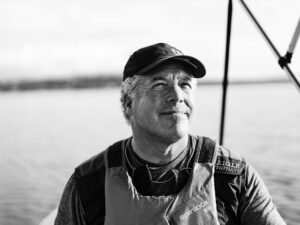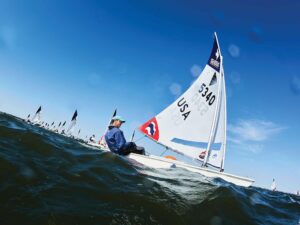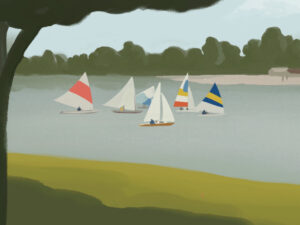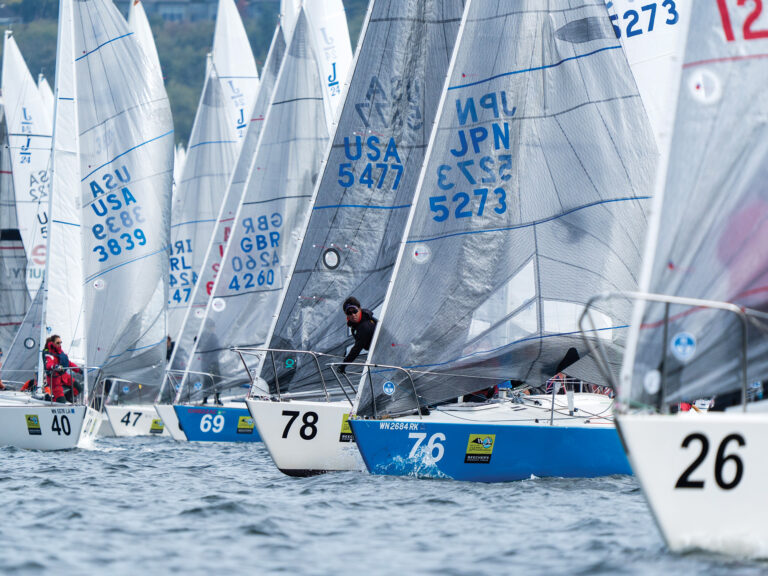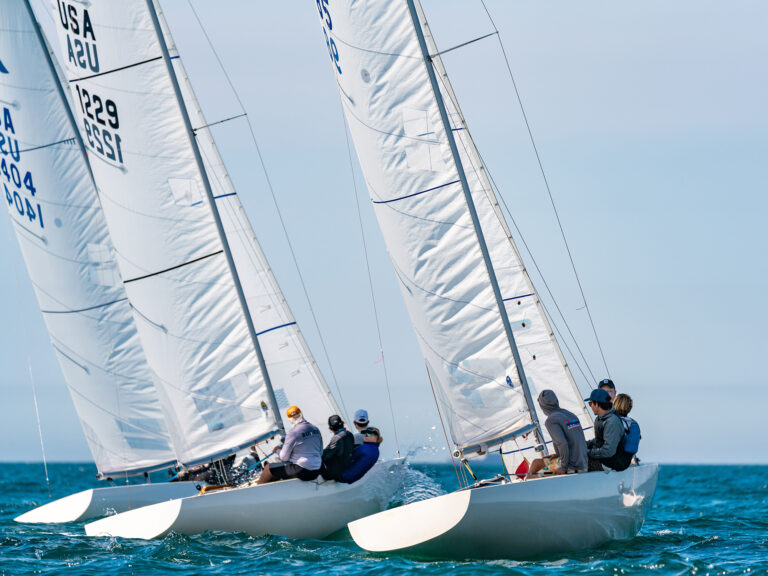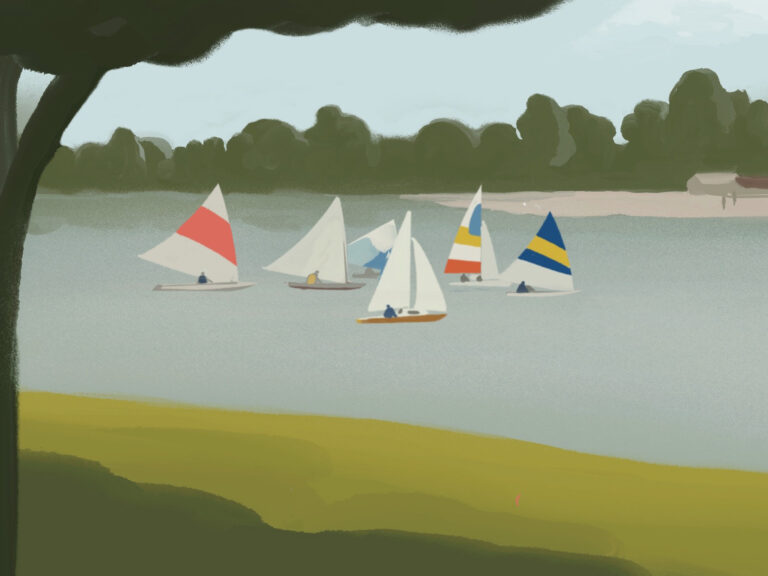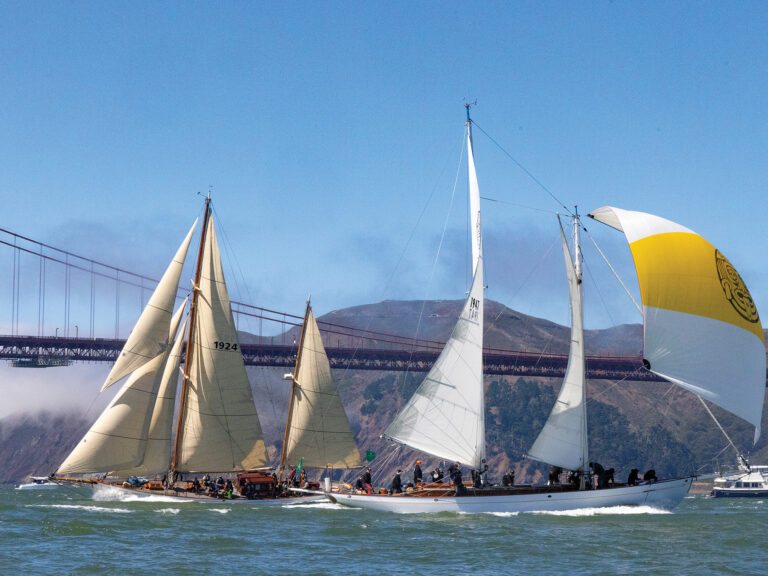Sailing World talked with Russell Coutts, two-time America’s Cup winner for New Zealand, after he was named to join the magazine’s Hall of Fame in April. Coutts, the skipper and a leader of the Swiss America’s Cup Challenge, spoke with us by telephone from Auckland where his team has been training.
Sailing World: In our June issue we have you on a page facing three-time Cup winner Charlie Barr–two top America’s Cup skippers separated by only about 100 years. I think you had a lot in common.
Russell Coutts: It’s quite amazing how much we have in common, actually. He was a Scot, and J.P. Morgan hired him to sail for the defense against a Scottish owner.
SW: A little bit parallel to what you’re doing now, right?
RC: [laughs] Yeah, a little bit that way.
SW: Who taught you the most about sailboat racing and helped form whatever philosophies you have about it?
RC: In my early days for sure it was my father, Allan, who died last year. I read all the early Elvström books, so he was an influence as well. I met him a couple of times actually; once in Denmark when I was doing a match race there, and another time at the ’84 Olympics.
SW: You’re only 40, but after so many campaigns, what keeps it fresh for you?
RC: Well this one I’m in now is a lot different than the ones I was involved in previously, especially the last two campaigns with New Zealand. They were with people I’d known or knew of for a long time. If you look at the sailing team alone, that group had sailed together over many campaigns in a lot of different boats over a long, long time. So this is all brand new. There’s five or six guys I’ve sailed with before but all the rest are guys I’ve sailed against in other campaigns. That’s been different from the start, and actually it’s been quite refreshing.
SW: Somehow you’ve kept the focus and intensity up over your whole career. What’s been your biggest disappointment?
RC: You learn more from your losses than your wins, at least I certainly do. I tend to remember those more for whatever reason. I’m not even sure it’s a good thing, but it’s a fact that I remember the lost races more than the ones I won. There’s been a ton of disappointments, but probably the two biggest were the Cup in ’92 and the Olympic Games, also in ’92, although the Olympic Games that year was literally a two-and-a-half month campaign. You wouldn’t call it a full-on campaign, but I was still disappointed we didn’t do better.
SW: What was it out of the ’92 Cup that stung the most and that you took away that really made a difference later?
RC: The ’92 Cup was where I learned the most. I took a lot of lessons about how to structure a team a little differently and what to put emphasis on. In ’92 we had some excellent people involved and when you looked at the team I believe it was a team probably capable of winning, but for whatever reason it didn’t really perform and didn’t make the right decisions at the critical moments. That was probably the biggest lesson–it was all very well to have a good group of people but somehow you need to form them into a group that makes good decisions and works together.
SW: Your emphasis since then has been on the team in Team New Zealand and in building your new Swiss team. What’s the key thing that you think about when you try to get back on center to make the team work better? Do you have a mantra that you come back to?
RC: Yes, yes I do. Any time it starts to get a little negative, which you always go through those moments in any campaign–we certainly went through plenty on Team New Zealand, for example–you try to really focus on the solution. Because by finding the solution, that’s something very, very positive; you can identify a whole list of problems, but in a lot of ways the real skill is finding solutions to those problems. That sounds very basic, but I think it’s quite an important thing to the team. The other thing is to look at how you can get more contribution out of people?
SW: Some people would call it delegating, but is it something a little different for you?
RC: It involves a lot of things actually. One thing is identifying interests, because if somebody’s not passionate about something, well–you can flog a horse but if it doesn’t want to go somewhere, it’s not going to go. So identifying the right roles for the right people is the first thing, and helping them then to buy into it. Trying to stimulate the right environment, where people really do want to contribute–so they’re not embarrassed and feel that they really can speak, and that takes a lot of time and effort.
SW: A lot of meetings or one-on-ones?
RC: A bit of both.
SW: What’s the formula?
RC: Time. You’ve got to give it the time. It doesn’t just happen by itself, although you start by hiring the right people–that’s always a good move and it certainly simplifies things–but beyond that people still need some stimulus.
SW: Have there been any issues between the inner circle of guys who came with you and the new part of the team?
RC: It was a matter of breaking down the past. You don’t want to have a group that’s always looking towards one person and saying, “Well, what now?” Or one group that’s looking towards another group and saying, “Well, what do you guys think?” The same realization would apply for all Cup teams that this time will be a little different; I think the level’s risen a fair bit and that what was achieved in the past perhaps won’t be good enough for this time. Some of same management techniques still apply, possibly, but in all areas I’m sure people are trying to come up with better ways of doing things.

